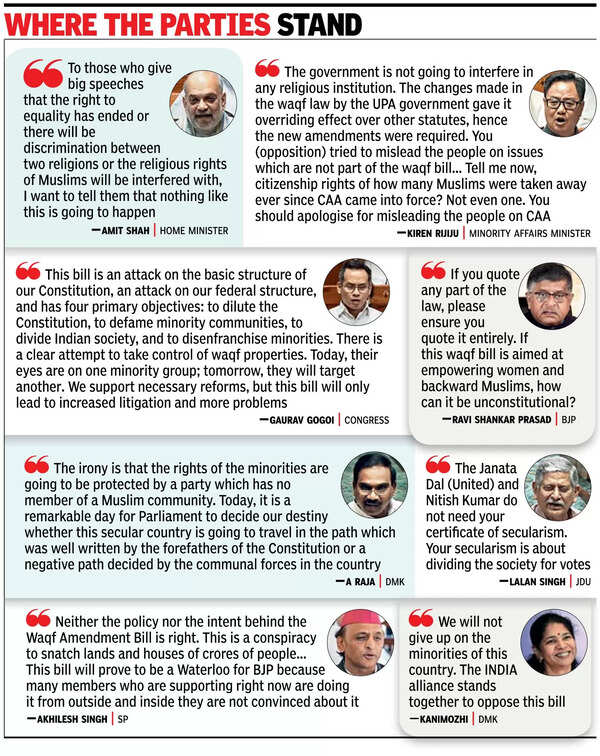Saffron ecosystem must be feeling ecstatic at its achievement of having Waqf board under its belt, acquiring vast tract of land owned by it across the country and pushing the Muslims to the position of second grade citizens. A closer introspection nevertheless would make it explicit that the strategy of saffron retribution will prove to be boon in disguise for Muslims as it would witness emergence of a new type of Muslim politics, having different culture and tenet.
Muslims are usually blamed for supporting a political party which champions their rights and fight for their aspirations. An impression is being crated that Muslims rally behind a political party which protects their social and economic interest. However this perception needs to be analysed in proper perspective; is it merely a canard or deliberate deception or trick. Why the Muslims restrained and did not assert. There ought to have been strong reasons.
Muslims have played a decisive role in Indian politics. They have shaped and even changed the political contour. The Malabar peasant struggle, famous 1921 Moplah Rebellion, was a significant event in Kerala’s history. It was fuelled by economic grievances, anti-British sentiments, and religious tensions, marking a resistance against both the British colonial rule and Hindu landlords. Then we have the celebrated Tebhaga peasant rebellion of West Bengal, which changed the nature and contour of peasant revolt across the country.
It is a fact that in Independent India Muslims were pushed to the periphery of the political and social structure. It is also a fact that the political parties discouraged the Muslim leaders from emerging as the face of the Muslim community. In the process the Muslims turned into vote bank. BJP accusing the secular parties of adopting the policy of appeasement is first step to alienate the Muslims from mainstream politics. To a large extent Muslims unwillingness to identity with the political system and take to proactive political role simply helped the RSS to demean and denigrate the Muslims.
One development ought to be mentioned at this stage. Sixties and seventies witnessed a number of communal riots. Though most of them owe their genesis to land ownership, the RSS used those riots to spread and strengthen its support base amongst the Hindus. I would like to mention at least two riots; one of Biharshariff and another of Jamshedpur. Both were triggered by the claim of the ownership of the land. After their persecution in the then East Pakistan, the Muslims of these two places who had migrated to that country, had started returning back to India. After landing here they wanted to get their lands back. But the people who were occupying the lands refused to part with. This was the primary reason for flaring up of the riot. RSS used the riots to prepare its base.
The BJP had supported UPA’s 2013 Waqf amendments. Among those who welcomed the changes at the time was BJP MP Shahnawaz Hussain, who termed the Bill “quite appropriate” and said it would lead to lesser encroachments of Waqf property. But in 2025 the Modi government accuses the then UPA government for creating a situation that made introducing the contentious Waqf (Amendment) Bill necessary. Amit Shah said in the Lok Sabha Wednesday that the 2014 amendment to the Waqf Act, 1995, was “extreme” and another “appeasement” exercise. If it was so, why the BJP had supported the bill in 2013?
While the 2013 amendment strengthened the functioning of tribunals, the 2025 Bill dilutes their significance in the overall administration of Waqf properties. While the 2013 amendment said the “decision of the tribunal in respect of such matter shall be final”, there is no such sentence in the new Bill. The new Bill changes the composition and functioning of the Central as well as state Waqf boards. It allows non-Muslims to be a part of the boards for the first time.
The entire exercise of changing the pattern of land acquisition and control smacks of the design to gift the waqf land and property to Adanis and other corporate giants. Already Modi has handed over many costly lands to Adani, like Dharavi slum. Last year in April Rahul Gandhi addressing a rally had said that Modi had “given away around 45,000 acres of land to Adanis for a meagre Rs 300 crore”. To take control of Waqf land and property, under the new Bill, there is no requirement for the Chief Executive Officer of a Waqf board to be a Muslim, although the appointment process introduced in 2013 has been retained. In India, a wide array of properties falls under waqf, which include mosques, idgahs, dargahs, khanqahs, imambaras, and qabristans (graveyards), among others.
It is unfortunate that the secular and democratic forces did not hit the streets to expose the saffron conspiracy. The Muslims were left to fend and fight their own battle. It is utopian to believe that in a situation where the Muslims have been at the target of the Hindutva forces and even the BJP governments have been using the state machinery to finish them, they would assert and fight to protect their rights. The BJP government of UP, led by Hindutva fanatic Yogi Adityanath, let loose reign of terror and even bulldozed hundreds of Muslim houses. His hatred towards Muslim is pronounced.
The Muslims preferred to tolerate the saffron torture and repression in the hope that sooner or later Modi would adopt a lenient attitude towards them and the period of nightmare would cease to exist. But the latest move of Modi sends a clear message that the saffron ecosystem is determined to finish them by completely dissipating their cultural and social identity.
The legislation passed by Parliament on Friday leaves no alternative for Muslims but to take to democratic struggle and assert their identity. This would witness emergence of new kind of Muslim leaders. Already, with the passage of bill, Muslims have been feeling betrayed and let down. Muslims are sceptical of the future of their next generation. They are scared of their rights being infringed on. They strongly nurse that RSS and BJP are determined to finish them.
The volte face of self-styled secular leaders Nitish Kumar, Chandrababu Naidu, Chirag Paswan has made them distrust the secular forces and parties. Already a significant number of Muslim leaders of Nitish’s JD(U) and Naidu’s TDP have quit. If the sources are to be believed some Muslim leaders will be meeting in Patna to explore possible options of going back to Congress or floating a new party committed to the Gandhian ideology.
Some senior Muslim leaders hold the view that Muslims should have a relook at their approach towards the political structure and parties. They say that Muslims most not allow themselves to be treated as vote banks. It is sad that the political parties do not allow a powerful Muslim voice to emerge in the political arena. Already right-wing groups have been claiming several mosques, arguing in court that they were once the site of Hindu worship. But in the absence of a strong Muslim leadership, no significant democratic movement could be launched. The Muslims are dependent on courts, which often come out with convoluted orders.
There is no doubt that the Bill underscores Modi’s broader plan to reshape the socio-political landscape, especially that of Muslim community. The sustained thrust of BJP leaders and Amit Shah that it will help the poor Muslims is quite intriguing. The bill is not supposed to alter the basic character of donation and recipient. Their thrust on poor underscores their design to change the basic character of donor and recipient. The poor Muslims would be enticed to go against the Islamic tenet and disobey the Waqf doctrine. The RSS and BJP would change the nature of waqfs and the waqf administration through amendments to definitions stipulated under the Act.
Already some Pasmanda Muslim leaders have praised Modi for the move. The National President of All India Muslim Jamaat, has expressed his strong support for the Waqf (Amendment) Bill, 2025, calling it a significant step toward improving the socio-economic conditions of Muslims in India. He said. The only ones who stand to lose are the Waqf land mafias (obviously implying rich and upper caste Muslims) who have illegally occupied valuable land. Common Muslims will not be affected by this”. (IPA Service)


 Nitish Kumar’s Political Woes Mount As Bihar Assembly Polls Are Approaching
Nitish Kumar’s Political Woes Mount As Bihar Assembly Polls Are Approaching 